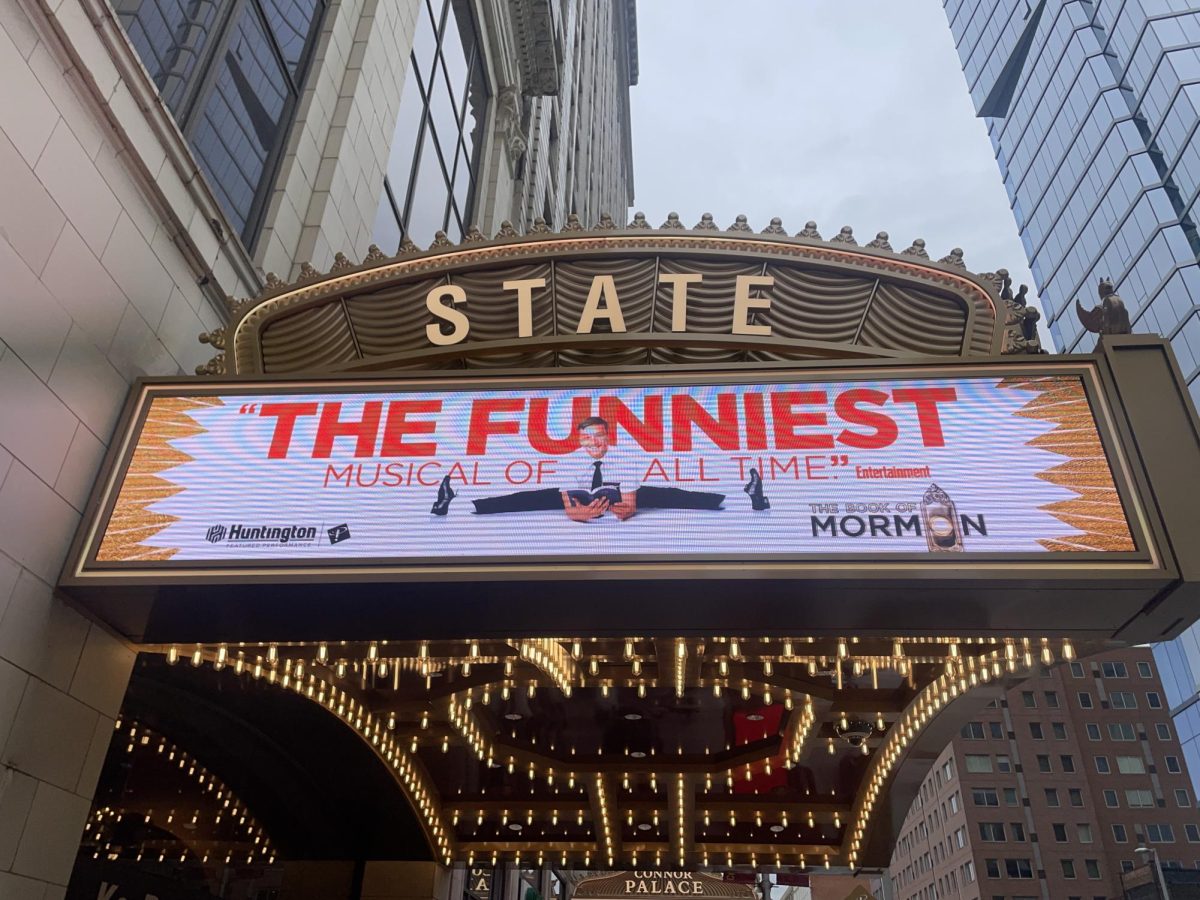“The Book of Mormon” is perhaps the most funny, yet raunchy, musical that I have ever seen. Its absurdity means that everyone can find something or someone to laugh at while watching, which is all too necessary in our stressful CWRU bubble. However, the musical was not without some flaws, such as its depiction of serious issues and problems with sound mixing.
“The Book of Mormon” is, at its core, a religious satire. The show follows the journey of two missionaries from the Church of Jesus Christ of Latter-day Saints—known colloquially as the Mormon Church—Elder Kevin Price and Elder Arnold Cunningham. Price is a refined religious zealot who believes his God-given mission is to preach in Orlando, Florida. On the other hand, Cunningham is a more haphazard, socially awkward fellow, who reveals midway through the show that he has not even read “The Book of Mormon.” This unlikely duo gets paired up and sent to an underperforming mission in rural Uganda.
When they first arrive, Price and Cunningham experience a large culture shock. They despair to find the mission’s population not only concerned with topics other than religion but outright hostile towards it. The missionaries’ fears about the Ugandans are realized as the villagers sing a song with a title that translates to, “F*ck You, God.” Due to these stresses, Price explodes on Cunningham and leaves the mission in a fit of anxiety and rage.
Even with these setbacks, the locals are willing to hear them out as Nabulungi, a local village resident whom Cunningham has a crush on, starts to believe in the promised land of Salt Lake City. Being nervous and a habitual liar, Cunningham fabricates wild and ludicrous stories that address problems that both impact rural Uganda and are also entertaining to her. Hearing this news, Price returns to the mission to confront a local warlord who is preventing the village’s conversion, but he is left in disarray after the meeting does not go well.
The show ends when the Mormon president for all the missions in Uganda visits the outpost, and becomes horrified when local residents do a play based on the whacky stories Cunningham was preaching. The mission president then shuts down the branch. Even after being shut down, the villagers, with the help of the other missionaries, drive out the warlords and end up starting a new religion based on “The Book of Arnold.”
Within the plot, the musical numbers were absolutely ludicrous. The amount of crude and sexual humor was unexpected, yet impeccably timed and never overdone. There were also frequent references to pop culture icons. For example, random characters from the Star Wars and Star Trek franchises would come on stage to say a line or two.
As a result, the show had an air of absolute absurdity that legitimized its original intent as a religious satire. Going into the show, I thought that I would relate to one of its two protagonists. Shortly after they were introduced, I found myself laughing at both of them instead. “The Book of Mormon” worked so well because it detached any sense of normalcy from its satirical prompt.
This cathartic humor is vital to the show. My favorite part of “The Book of Mormon” was that it gave the viewer a blanket license to laugh. By showing its two main characters in such an absurdist fashion, it meant that we did not become too emotionally attached to them to laugh at their failures. The show was not at all taxing to follow—I treated it like reading “The Athenian” rather than “War and Peace.”
It is important to note that the show also does touch on some serious issues, such as female genital mutilation and the AIDS crisis. Following the absurdity of the humor discussed above, the characters addressed it in a way that was generally tactless and crude, making it one of the production’s few drawbacks.
Lastly—and to no fault of the touring company—the sound mixing in the theater was awful. Khushali Desai, a fourth-year student and the business director for The Observer, saw the show twice, once in San Francisco and once recently in Cleveland. Compared to San Francisco, she noted that at the KeyBank State Theatre, “you could barely hear the voices of the people singing and talking, because the sound of the orchestra and backing track was way too loud. The overall sound of the musical was your breaking eardrums shattering horrendously; [it was] loud and thoroughly unenjoyable.”
When I saw the production, the last words of the last number were completely lost on me, as I could not hear it over the sound of the orchestra and other voices. It was only after researching for this article that I found out they were “The Book of Arnold.” It would have been so much more funny and impactful if I could have heard it live.
Despite these flaws, “The Book of Mormon” was a beyond hilarious musical. If it comes by again during midterms or finals season, I would highly recommend it to anyone as an excuse to laugh and de-stress.



